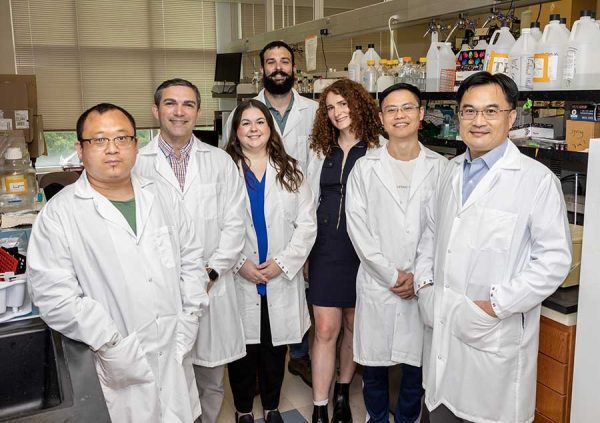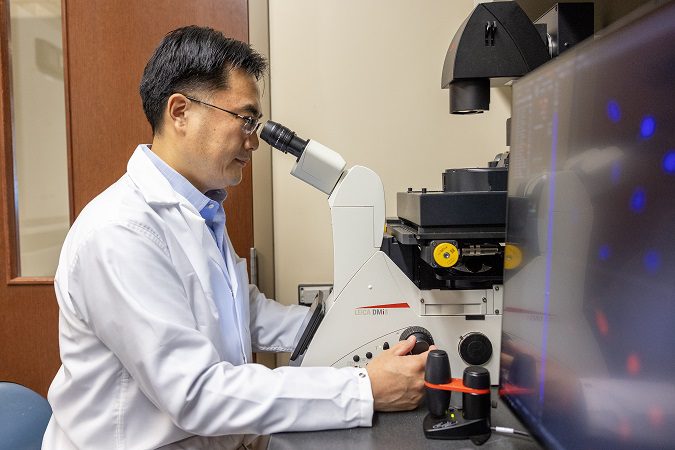Finding a cure for cancer, one DNA damage pathway at a time

Shan Yan and his research group at UNC Charlotte conduct basic research to scout next targets in the battle against cancer.
This year, around 64,000 Americans will be diagnosed with pancreatic cancer, which has a five-year survival rate of just 12%. That means in 2023 alone, around 50,000 Americans will die from the disease. One lab at the University of North Carolina at Charlotte is trying to change those numbers, starting at the molecular level.
For over a dozen years, Professor Shan Yan has run a lab in the Department of Biological Sciences, focused on how specific proteins interact with DNA, the blueprints for building cell parts. When DNA is damaged, something that happens 10,000 times a day in our cells, proteins in our cells try their best to repair the damage. But when they mess up, cancer can grow. By studying how specific proteins, called APE proteins, interact with DNA damage repair and with chemotherapy drugs, his “preclinical” lab’s basic research paves the way for precision medicine and cancer treatments.
Scores of research papers into protein functions and cancer
Supported by the National Cancer Institute, the National Institute of Environmental Health and the National Institute of General Medical Sciences at the National Institutes of Health, Yan’s team of scientists tackle basic but significant questions in the field of genome science and cancer.
Much of the Yan lab’s research starts with proteins harvested from eggs from African clawed frogs. Yan’s phalanx of postdocs, graduate students and undergraduates isolate specific proteins which they use for experiments. In particular, his lab, which he founded after he arrived at UNC Charlotte from a post-doctoral fellowship at Harvard University, has shone a light on the treatment possibilities around two proteins called APE1 and APE2.
We knew that both APE1 and APE2 are involved in repairing DNA damage, but before the Yan lab’s innovative approach, it was hard to figure out what was happening at the molecular level. The lab’s technical advancements with frog egg extracts were key in figuring out how APE1 and APE2 act. This basic research in APE1/2 biology, genome integrity and cancer have been published in prestigious scientific journals such as PNAS (published by the National Academy of Sciences).
“Dr. Yan has a really good eye for which proteins that aren’t being studied will turn out to be important,” said Ph.D. candidate and research assistant Anne McMahon, a member of the Yan lab. “He has really added a lot to the intellectual merit of APE1 and APE2.”
Among the highlights of the research projects out of the Yan lab:
- Last year, his lab found a new calling for the protein APE1: It can act as a beacon for other molecules to find and attack the DNA plans for protein factories that cancer relies on to expand through the body. This beacon is the latest in a 15-year-old journey of several scientists delineating the pathways of DNA damage responses in nucleoli, a particular region in cells. By attacking these mechanisms, future applied researchers will be able to trip up cancer’s reproduction and growth.
- As researchers have recently connected APE2 in cancer patients with mutations in BRCA1 and BRCA2 genes (associated with breast cancer), the next hope is to develop drugs that target APE2 for future “precision medicine” interventions with breast cancer. In the same vein, the Yan lab discovered Celastrol, a natural compound isolated from a vine used in traditional Chinese medicine, as the first-ever “small molecule inhibitor” of APE2 function in DNA repair and pancreatic cancers. That means Celastrol could be the jumping off point to create a new drug to target APE2 in pancreatic cancer.
- For years, doctors have known that the common chemotherapy drug cisplatin sometimes causes kidney failure. With researchers from the Cleveland Clinic and a $2.6 million NIH/NCI grant, the Yan lab investigated the causes of the failure, and thereby pinpointed a research direction for prevention. They found that excess APE2 would accumulate in the mitochondria, the “powerhouse” region of the cell and lead to mitochondrial dysfunction and kidney injury. When they disrupted APE2, their mice showed no injury in their kidneys. They published the results in 2021 in the prestigious journal Cancer Research.
- In another high-profile collaboration, Yan and his colleagues in the Chemistry and Biological Sciences departments developed a nanoparticle-based delivery system to avoid toxic side effects in other organs with a $2 million NCI grant. The interdepartmental research team at UNC Charlotte had developed a molecule that could recognize the cancer but not normal cells, so by working together they could directly deliver cisplatin and other chemotherapy drugs.
These collaborations highlight the innovation that takes place in the Yan lab, which buzzes with activity and has undergone three expansions since 2010, when he established the lab. As a leading research lab in the field of APE biology and cancer at the national and international levels, Yan received the 2022 Outstanding Data Science Faculty Research Award from the School of Data Science at UNC Charlotte.
As McMahon said, “it takes a lot of creativity to understand what’s happening in a cell, because you need to imagine what’s happening first, and then test for that.”
Beyond just research: the lab’s outstanding mentorship and outreach
 Yan’s research underscores the power of teamwork across labs, exemplified by the Genome Integrity and Cancer Initiative, which unites six labs and about 40 faculty members at UNC Charlotte in the basic research behind how cancer grows and how we can disrupt it. Founded by Yan in 2018, the initiative currently has around $10 million from NIH and NSF funding and regularly publishes world-class research papers.
Yan’s research underscores the power of teamwork across labs, exemplified by the Genome Integrity and Cancer Initiative, which unites six labs and about 40 faculty members at UNC Charlotte in the basic research behind how cancer grows and how we can disrupt it. Founded by Yan in 2018, the initiative currently has around $10 million from NIH and NSF funding and regularly publishes world-class research papers.
“This area of research at UNC Charlotte is leading in the national competition and national conversation, as you can tell from the federal funding and research publications in top-tier peer-reviewed journals such as PNAS, Nucleic Acids Res, and eLife, among others,” Yan said.
Yan also has developed a group to encourage mentorship, professional development and scientific collaboration. Created in 2017, the Charlotte Biology and Biotechnology Exchange Group, co-sponsored by North Carolina Biotechnology Center and UNC Charlotte, invites top researchers for day-long visits to the University. They’ve brought in two dozen scientists from places such as the NIH, Harvard, Stanford, Columbia and other storied institutions to give lectures, have lunch with students and discuss research projects and potential collaborations with UNC Charlotte faculty.
Emphasizing a diverse and inclusive research environment, Yan beams with pride when discussing the ~25 undergraduates, 13 graduate students and four postdoctoral fellows whom he’s mentored over the years. He points to Jude Raj ’16, who worked in the lab for three years and published two research papers as an undergraduate, then went on to a post-baccalaureate job at Yale University and now is in Duke’s prestigious joint MD/Ph.D. program, as an exemplar of what UNC Charlotte can offer. Another graduate student, Md Akram Hossain ‘21, attained a postdoctoral position at the University of Pennsylvania after finishing his Ph.D. degree.
“How many parents are missing the great training and opportunities here? If your kid wants to go to medical school, this is where you can start,” Yan said. “People may think UNC Charlotte is plan B or C for their college students, but if you choose the right mentor, there is great potential here.”
Alumni from his lab include one of the four Barry Goldwater Scholarship recipients in the University’s history, a Levine scholar, several NSF REU fellows and several Charlotte Research Scholars, and he’s always looking to mentor the world’s next generation of scientists.
“Whether students just graduate college or want to go to graduate school or another advanced program, we are a key part of helping them to achieve their career goals,” Yan said. “It’s not only that you take some courses or research credits and you’re done. This is training — you can learn from the leading scientists in the world and build upon your career from here, UNC Charlotte.”
Top Photo: Shan Yan, right, with his laboratory team, from left, Jia Li, Garrett Driscoll, Kelly McGhee, Josh Matos, Anne McMahon and Haichao Zhao.